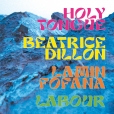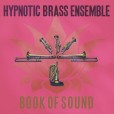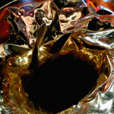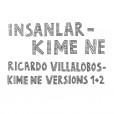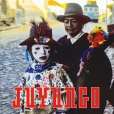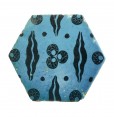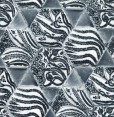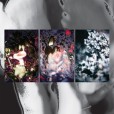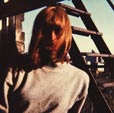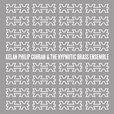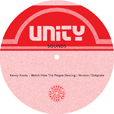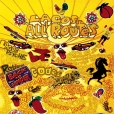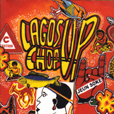Your basket is empty

Four dazzling, extended engagements with mbalax master-drumming.
The contribution from Holy Tongue is chase-the-devil steppers — thumping, clangorous, reverberating — super-charged with energy and atmosphere. From the off, drummer Valentina Magaletti detonates a hard rain of small bombs, rounds of fire, ticking fuses. Musical co-ordinates are somewhere between classic On-U Sound crew like African Head Charge, The Mothmen, and Creation Rebel, and the experimental funk of the Pop Group and 23 Skidoo, at their funkiest. Thrillingly, the two dubs are increasingly deranged.
Adjusting the same wavelengths as her superb Workaround LP, Beatrice Dillon plays spaced-out, abstract synth-work against the bodily physicality of the ancient, shifting mbalax rhythms. The music is poised, mindful, tentative; but also limber, fleet, and magical.
Phantasmagorical and efflorescent, Lamin Fofana’s one-two is simply stunning. Both excursions are wide-open, beautiful, epic, and propulsive — the first mix is banging and headlong, the second more syncopated and serpentine — teeming with freshly sublime, funkdafied updates on Jon Hassell’s Fourth World possible musics.
The two parts of LABOUR’s Etu Keur Gui engage the same sequence of drum patterns (called bakks) from different perspectives. The duo performed portions of this piece at the opening ceremony of the Dakar Biennial in 2022, at the Grand National Theater, with thirty sabar players from the family of Doudou Ndiaye Rose. This Wolof phrase for the inside-yard of a home — a meeting-place, an architectural breather — doubles here as a metaphor for inner space on a metaphysical level; and Pan Sonic, Muslimgauze, Zoviet France, early Shackleton… all ghost across the threshold.
2.5 centimetres in diameter.
A top-quality, hard-enamel lapel pin (with back post and gold-metal clutch); the size of a 2p coin.
New colours.
Red and pink on dark navy. Premium cotton, smooth and durable. 67cm shoulder strap.
Takes twenty-odd LPs.
With our logo as shown, on the front of shirt; and blown up, centred, on the back.
With our logo on the front of the shirt, as shown to the far left; and blown up, centred, on the back.
These sweatshirts from AS Colour are exceptionally well-made; soft to the touch, with perfect heft, and excellent ribbing around the neck, cuffs and hem.
‘Mid-weight, 320 GSM, 80% cotton 20% recycled polyester CVC fleece. Pre-shrunk to minimise shrinkage, pullover crew, drop shoulder, crew neck, garment dyed, sleeve cuff ribbing.’
The sizing is very generous. Some of you will prefer a size smaller than usual. Please click through the image for a guide.
White on grey. Premium cotton, smooth and durable. 67cm shoulder strap.
Takes twenty-odd LPs.
A top-quality, hard-enamel lapel pin (with back post and gold metal clutch); the size of a 2p coin.
New colours.
“We started with a cosmic idea that we were taught from a very young age – that the stars and planets make a sound, that deep in outer space there is audible harmony.”
Book Of Sound is the brilliant, richly resonant exploration of these interstellar low ways. By turns urgent and contemplative, funky and reflective; varied in its textures, but entirely of one piece. Underpinned by cosmology, held in place by meditation, swirling with notions of history, science, theology, ancestry — this is a heady conceptual brew. But the music speaks loudest: ‘the sound of surprise’, magnificently retrieving Spiritual Jazz from the knacker’s yard.
It’s a deeply Chicagoan record. “It’s got the vibe of the lake,’ continues trombonist Cid, “the vibe of the prairies opening up to the west.” Also the Sun Ra albums recorded there in the 1950s, and — of course, being the dad of all seven ensemblists — Phil Cohran’s wonderful albums from the 1960s.
“You know, it’s tough trying to satisfy everybody with our music. It’s hard enough satisfying ourselves, let alone the jazz scene, the hip hop guys, what have you. With this album we just dropped all that as a consideration, and tuned into deeper principles.”
Tear-up bad-boy brass-band scorchers. Just like dad crossed Sun Ra with Kool And The Gang, this crashes funkdafied New Orleans street jazz into hip hop. With Flea, Damon, Tony Allen, Malcolm from The Heliocentrics.
Stunning new music from Istanbul!
A twenty-four-minute wig-out you can dance to — wild baglama improvisation and mystical male-unison singing, atop the propulsive mass of a Berlin half-stepper, with turbulent detours into dub, radiophonics and psychedelia.
‘Kime Ne’ means ‘so what’, ‘what’s it got to do with you’. The song adapts verses from the seventeenth-century poet Kul Nesimi, wistfully invoking the Melami strain of Sufism as a touchstone of humility and tolerance, in dark times. ‘Insanlar’ means ‘humankind’... ‘The Human Beings’.
RV’s mixes are expert, taut and hard-grooving. 2 is the more agitated and dubwise.
Nearly an hour of music, on three sides; the fourth is etched with Katharina Immekus’ lovely artwork.
Knockout stuff, honestly.
‘Since the 16th century, the Ecuadorian province of Esmeraldas has been home to a unique Afro-Indigenous culture originating in the integration of the Indigenous Chachi and Nigua peoples with African Maroon communities. Juyungo documents significant Esmeraldan artists and bands playing the Afro-Ecuadorian folklore of the province, as well as including some older field recordings. Based mostly on the marimba, whose origins lie partly in the African balafon, partly in Indigenous percussion instruments, the music is laced with call and response chants, ambient insect and bird noise, the filigree finger-styles of the Andean guitar tradition and the panpipes of the mountains. This is resonant insider roots music at its headiest — the mystic revelation of Esmeraldas, gully deep and lustral.’ Francis Gooding, The Wire.
The fifth in our series of LPs compiling classic music from Ecuador. Customary Honest Jons runnings: a beautiful gatefold sleeve; superior pressing, with vivid, intimate sound; full-size, sixteen-page booklet, in colour throughout, with detailed, fascinating, bi-lingual notes, and stunning photographs.
The music is transfixing, magical; not like anything else. From start to finish, this album is continuously, profoundly immersive; a kind of journeying, trippy meditation about slavery and cultural resistance, identity and mix, places and spaces, futures and pasts. It’s inscrutable to net-surfing, algorithms, Shuffle. But for a taste try the insurgent marimba roller Agua Largo, jet-propelled by Rosa Huila’s rapturous blend of African spiritualist and Christian chant. ‘Healing music,’ Zakia called it on Gilles Peterson’s BBC show recently. And the ravishing pasillo Kasilla Shungulla — ‘calm your heart’ in the Quichua language — a duet between the Peruvian master-guitarist Raúl García Zárate and viola da gamba by Juan Luis Restrepo from Medellin, recorded in a baroque church in Buzbanza, Colombia.
Pure worries from Leipzig — three club burners steeped in Detroit traditions, distilling the explorations in collective, nervy hypnosis of KM live sets. As the music slowly unfurls, there he is at every turn, subtly tweaking its parameters, redistributing its weight, pricking its grooves into a state of utterly infectious perpetual movement.
The two visions of Chilazon track opposite pathways: the first is twelve minutes of gorgeous, dubwise, aquatic techno, spattered with kicks and razor-sharp hi-hats, and smeared with ghostly echoes; then a terse mesh of broken drums, escalating to a quiet yet feverishly intense peak. Lanthanum is calligraphic swordplay, its toms and bass stabs warily circling one another in a graceful steppers’ dance, spaced-out and fathoms-deep.
Fierce, subtle music, radically strange and unafraid of the deep, but with a killer understanding of rhythm. Lush drum-machine nocturnes, gnarly electronica and glorious flowerings of zoned-out dubspace: an evolutionary music, continuously engaged with experimentation both in the studio and the club.
Whether prepared solo, or jointly with his spar Mix Mup, a Kassem Mosse recording is less of a stand-alone creation than the next thrilling installment of an unstoppable groove. True to form, Disclosure dazzlingly extends some of the most mystical, essential dancefloor-rooted music of the last decade, from dusty, dream-state techno on Workshop and Mikrodisko, to frazzled beatdowns on Trilogy Tapes and Nonplus.
Pedigree techno and house are the lifeblood of Disclosure, yet with something newly microscopic about them. Its mesmerising juggle of pointillistic percussion, melting-wax chords and fleshy bump’n’grind suggests biological processes at work, as if Mosse has zoomed right into the cellular metabolism ticking away at the core of the music.
These textures are woven into some of KM’s richest and most emotionally complex material so far, constantly enlivened by forays into jazz, dub and beyond. Check the farty-bottom, broken-down, steel-pan minimalism of Collapsing Dual Core, just the job for coursing around Detroit in a car at night; and Phoenicia Wireless’ dastardly, intricate combination of glowering John Carpenter synths, heavy static and junked consoles on remote, as if the beats are fighting a wave of dirt, soot and fossilisation. The frantic, interstella tarantella of Galaxy Series 7; the wonky bump-and-hustle and heavy-lidded drama of Purple Graphene, to close.
Expertly pieced-together and paced, Disclosure brilliantly registers all the self-contained coherence and artistic authority of an album proper, yet shadowed throughout by the open-ended and questing spirit so vital to Mosse’s music. Its intimate enactments of non-closure, and its sense that anything could happen at any moment; its thematic play between excess and incompleteness, babble and tongue-tied stutter, and-you-don’t-stop grooving and entropy, wobble and the pause-button.
Trash and ready in a spiffy Bankhead sleeve, too.
Double bim. Bim, bim.
‘**** CD Of The Week… everything her followers have long cherished about Keineg… An uncompromising and long overdue return’ (Sunday Times).
**** Daily Mirror; **** Financial Times.
Brand new recordings, this is majestic, surging, scintillating music — with swing, jump and shout, Sun Ra, Mingus and Gil Evans, Arab-Andalusian music, hip hop and New Orleans funk all coursing through.
‘*****’, The Independent; ‘captivating… Q Recommends’; ‘there is no end of exhilarating music on this beguiling album’, The Sunday Times; ‘full of heartstopping musical twists and turns’, The Beat.
‘*****’, The Independent; ‘a vibrancy and energy that make it impossible to sit still’, Metro; ‘shines from Shina to Shina’, The Beat; ‘CD Of The Week… astonishing’, Daily Telegraph; ‘incendiary’, The Observer.
